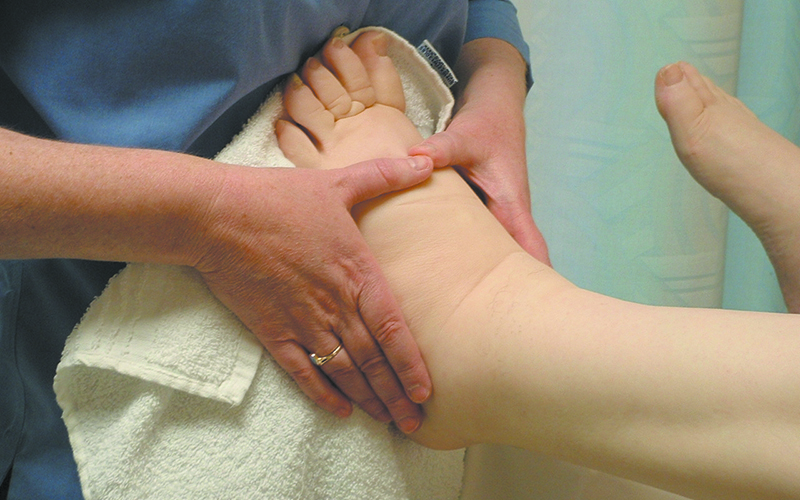
March is Lymphedema Awareness Month and Valley’s certified lymphedema therapists want you to know there’s help for you if you are experiencing this condition.
What is lymphedema?
Lymphedema is a chronic condition that causes swelling because of a damaged or inadequate lymphatic system. The lymphatic system helps our body balance fluids, so if lymph nodes are damaged, they cannot drain well, causing fluid to build up and swelling to occur. Lymphedema can occur anywhere in the body including arms, legs, abdomen, face, neck or genital region.
What are symptoms of lymphedema?
The main symptom of lymphedema is swelling, which may or may not make an indentation when pressed (called pitting). Sometimes the first sign is a feeling of achiness or heaviness or noticing that a piece of clothing or jewelry may feel tighter than normal.
What are the risk factors and what causes lymphedema?
Lymphedema is usually caused by a problem with the lymphatic system. This can be due to surgery or radiation therapy for cancer treatment, or repeated infections called cellulitis that cause inflammation. There are also hereditary forms of lymphedema if the lymphatic system does not develop properly. Other causes for lymphedema in the legs can include obesity, prolonged sitting, or an inactive lifestyle.
How is lymphedema treated? Can it be cured?
Lymphedema can be managed but not cured. The gold standard for lymphedema treatment includes a combination of compression, skin care, exercise and manual lymphatic drainage massage. After an evaluation, your therapist will come up with an individualized treatment plan to fit your specific needs. Education about managing it at home is also an important part of the treatment plan.
Who treats lymphedema? What kind of training/education is required?
Lymphedema can be treated by either a physical or occupational therapist. Valley’s Outpatient Therapy Services has three therapists who have advanced training and are certified in lymphedema management. Valley’s lymphedema therapists are also trained to perform pre-surgical evaluations before surgery for breast cancer, where the risk of lymphedema can be discussed, and baseline measurements can be taken.
Meet Valley’s therapists certified in lymphedema management.
How can lymphedema be prevented?
There is no guaranteed way to prevent lymphedema related to cancer treatment, but there are ways to help lower your risk and reduce the chance of it getting worse. The risk of lymphedema during and after cancer treatment can be minimized by avoiding triggers such as infection, injury to the area, extreme heat or cold, wearing tight clothing, or having your blood pressure taken on the affected area.
The risk for lymphedema in the legs, often caused by other factors such as obesity or inactivity, can be lessened by maintaining a healthy weight and a more active lifestyle.
Everyone who has been diagnosed with lymphedema can prevent their swelling from worsening with the help of a lymphedema therapist and following the recommendations of their providers.
I think I might benefit from lymphedema treatment. Do I need a referral?
Since there are many different causes of swelling, it is important to discuss your symptoms with your primary care provider to help determine whether a referral for lymphedema management is appropriate for you.


Hello Valley Medical Center, from the Northwest Lymphedema Center located in Seattle and serving the Pacific Northwest. We are a nonprofit devoted to education, support, and advocacy for lymphedema patients and their caregivers, plus medical professionals. We maintain a directory of Certified Lymphedema Therapists that may be helpful to your patients, including Valley Medical’s therapists. Please see our website at http://www.nwlymphedemacenter.org, or reach out to me, Laurie Jones, Board Co-Chair at laurie@nwlymphedemacenter.org., regarding our directory or any educational or support services you might be interested in. Many thanks! Best of health to you and to all, Laurie
Thank you for the information, Laurie! We tried to email you some updated information for your directory but the email came back as rejected by your email server. Could you please try emailing us at blog@valleymed.org?